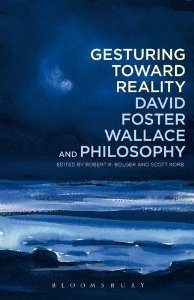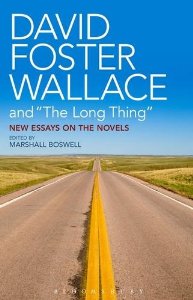Updated 11/6/14 See below for some updated impressions of a few more essays.
Robert K. Bulger and Scott Korb's Gesturing Toward Reality: David Foster Wallace and Philosophy is available now via Amazon.com ahead of its June 19 release date.
I spent part of the weekend past making my way through the first four essays in the collection and I've found much to enjoy and think about so far. Admittedly, I've never been a Wallace reader too interested in overt spiritual or religious angles of his work (which are the focus of a few of these early essays) but in this case there's some really interesting interpretations and cases put forward. Particularly interesting was Bulger's essay, 'A Less "Bullshitty" Way To Live: The Pragmatic Spirituality of David Foster Wallace', which includes numerous examples of Bulger's email correspondence with Wallace on this very topic. Fascinating.
There are more than a few essays in here about philosophy, and more specifically on Wallace's fatalism thesis found in, Fate, Time, and Language: An Essay on Free Will. Durantaye's essay, 'The Subsurface Unity of All Things, or David Foster Wallace's Free Will', considers the parallels between ideas in Wallace's fatalism thesis and his This Is Water address.
Update 11/6:
So this collection has moved from the very interesting to must have.
Andrew Bennet's 'Inside David Foster Wallace's Head: Attention, Loneliness, Suicide, and the Other Side of Boredom' is an absolutely gripping essay about attention, loneliness and boredom throughout Wallace's work. For example, Bennet points out a likely connection between the Infinite Jest minor character, Zoltan Csikszentmihayli and Hungarian-American psychologist Mihaly Csikszentmihayli whose first book was titled, Beyond Boredom and Anxiety, and whose 1990 book, Flow: The Psychology of Optimal Experience, was owned and annotated by Wallace. The collection is worth it for this essay alone.
In 'The Lobster Considered' Robert C. Jones packs an impressive body of research, detail and thought encompassing human understandings of pain and how we decide/determine if other creatures experience pain. Sentience and pain, what is pain?, insects, spiders, crustaceans, and objections to arguments about pain from multiple perspectives. A wonderful paper that drills deeply into the depths of Wallace's essay, 'Consider the Lobster'.
More as I make my way through the collection.
Available now, also from Bloomsbury, is David Foster Wallace and "The Long Thing": New Essays on the Novels. I can't wait to read this one. (I have it and have started reading, first impressions soon!)
| < Prev | Next > |
|---|






